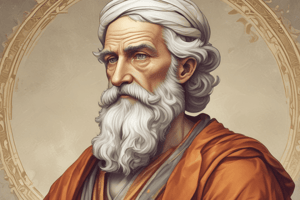Podcast
Questions and Answers
Which concept refers to prioritizing moral choices over external outcomes?
Which concept refers to prioritizing moral choices over external outcomes?
- Prohairesis (correct)
- Divine Order
- Detachment
- Phantasia
Moderation is seen as a weakness that hinders independence and inner peace.
Moderation is seen as a weakness that hinders independence and inner peace.
False (B)
What should one do to prepare for inevitable challenges in life according to Stoicism?
What should one do to prepare for inevitable challenges in life according to Stoicism?
Reflect on actions and thoughts.
To achieve tranquility, one must embrace loss, hardship, and death as ______.
To achieve tranquility, one must embrace loss, hardship, and death as ______.
Match the following Stoic concepts with their descriptions:
Match the following Stoic concepts with their descriptions:
What does phantasia represent in contrast to phainomena?
What does phantasia represent in contrast to phainomena?
Accepting loss, illness, or death is contradictory to nature.
Accepting loss, illness, or death is contradictory to nature.
What role do analogies serve in understanding life's transient nature?
What role do analogies serve in understanding life's transient nature?
True wealth comes from desiring only what is __________.
True wealth comes from desiring only what is __________.
Match the following concepts to their descriptions:
Match the following concepts to their descriptions:
Which of the following statements illustrates the concept of detachment?
Which of the following statements illustrates the concept of detachment?
Experiencing annoyance in a chaotic situation is an inevitability.
Experiencing annoyance in a chaotic situation is an inevitability.
What should you do when criticized to reflect on the situation?
What should you do when criticized to reflect on the situation?
Which of the following elements are considered to be beyond our control according to Epictetus?
Which of the following elements are considered to be beyond our control according to Epictetus?
Achieving tranquility involves aligning our desires with what is beyond our control.
Achieving tranquility involves aligning our desires with what is beyond our control.
What is the purpose of imagining worst-case scenarios according to Epictetus?
What is the purpose of imagining worst-case scenarios according to Epictetus?
Living according to ______ involves aligning choices with the natural order.
Living according to ______ involves aligning choices with the natural order.
Match the analogy with its meaning in Epictetus' philosophy:
Match the analogy with its meaning in Epictetus' philosophy:
What is emphasized as crucial when dealing with others?
What is emphasized as crucial when dealing with others?
Detachment in relationships is discouraged by Epictetus.
Detachment in relationships is discouraged by Epictetus.
According to Epictetus, what mindset helps cultivate resilience when faced with loss?
According to Epictetus, what mindset helps cultivate resilience when faced with loss?
Flashcards
Prioritize inner values
Prioritize inner values
Align actions with personal values, not external rewards or societal expectations.
Accepting Divine Order
Accepting Divine Order
See life's challenges as part of a larger, purposeful design and align your will with divine wisdom.
Practice Stoicism daily
Practice Stoicism daily
Make Stoic principles habitual through self-reflection, preparing for challenges, and differentiating between controllable and uncontrollable aspects of life.
Question first impressions
Question first impressions
Signup and view all the flashcards
Moderation as Strength
Moderation as Strength
Signup and view all the flashcards
Control your reactions
Control your reactions
Signup and view all the flashcards
Distinguish Phantasias from Phainomena
Distinguish Phantasias from Phainomena
Signup and view all the flashcards
Living according to Phusis
Living according to Phusis
Signup and view all the flashcards
Role of Analogies
Role of Analogies
Signup and view all the flashcards
Detachment & Moderation
Detachment & Moderation
Signup and view all the flashcards
True Wealth
True Wealth
Signup and view all the flashcards
Ataraxia (Tranquility)
Ataraxia (Tranquility)
Signup and view all the flashcards
Transient Life
Transient Life
Signup and view all the flashcards
Epictetus' Controllable vs. Uncontrollable
Epictetus' Controllable vs. Uncontrollable
Signup and view all the flashcards
Ataraxia
Ataraxia
Signup and view all the flashcards
Phusis
Phusis
Signup and view all the flashcards
Worst-Case Scenarios
Worst-Case Scenarios
Signup and view all the flashcards
Living According to Nature
Living According to Nature
Signup and view all the flashcards
Judging Others
Judging Others
Signup and view all the flashcards
Self-Control & Moderation
Self-Control & Moderation
Signup and view all the flashcards
Detach from Loss
Detach from Loss
Signup and view all the flashcards
Study Notes
Key Distinctions
- Epictetus' philosophy centers on distinguishing between what's within our control (opinions, desires, aversions) and what's beyond our control (body, possessions, reputation).
- Uncontrollable elements are considered "alien to our nature" and subject to hindrance.
Practical Philosophy: Ataraxia (Unperturbedness)
- Achieving tranquility involves aligning desires with what's within our control.
- Worst-case scenarios should be envisioned to prepare for setbacks and maintain emotional balance. Mental preparation for difficult situations helps endure them.
Phusis (Nature)
- Living according to Nature involves aligning choices with the natural order and recognizing physical and emotional limitations.
- Interpretations lead to suffering; accepting natural occurrences as morally neutral helps reduce it.
Analogy as a Teaching Tool
- Epictetus uses analogies like ships, harbors, feasts, and plays to illustrate different life lessons.
- Analogies help to understand transient nature and the importance of accepting one's role in life.
Practical Examples from Stoic Role Models
- Epictetus highlights figures like Socrates, Heraclitus, Zeno, and Diogenes to exemplify living virtuously and freely from external dependencies.
Ethical Guidance
- Dealing with others involves avoiding hasty judgments and focusing on motivations.
- Emotional reactions stem from opinions about events, not the events themselves.
Specific Guidelines
- Self-control involves avoiding externalizing blame and aligning desires with what's within our control.
- Moderation is key in dealing with pleasures and material pursuits without attachment.
Red-Annotated Insights
- Phantasia (imagination) influences perception, needing distinction from reality.
- Prohairesis (moral choice): True freedom lies in exercising choice aligned with reason and virtue.
Red-Annotated Insights
- Dogmata (beliefs) shape emotions. Aligning them with Stoic principles prevents turmoil.
- Stoic emotions are rooted in false beliefs .
Role of the Divine and Fate
- The universe operates under divine reason and justice, with acceptance of fate leading to harmony.
- The natural order is crucial for understanding the gods' role.
Missteps to Avoid
- Seeking external validation or wealth at the expense of virtue is a misstep.
- Dwelling on the opinions or actions of others is not productive. Control our own choices and actions.
Handling External Events and Emotions
- External events are neutral; our response to them determines our distress.
- Introspection is crucial in distinguishing reality from impressions. Train your mind and thoughts to remain calm.
Freedom and Mastery
- True freedom is achieved by detaching from external things, focusing on what's within our power.
Moral Responsibility and Social Roles
- Treat others with understanding, recognizing their actions stem from their perceptions, and avoiding harsh judgments (or vengeance).
- Ignorance is the root of harm
Detachment and Simplicity
- Minimalism in desires helps avoid overabundance and strengthens moral resilience.
Suffering and Perspective
- Misery arises when events are labeled harmful rather than neutral.
- Accepting events as neither good nor bad fosters resilience. Take experiences as lessons and growth opportunities
The Role of Self-Discipline (Askesis)
- Avoid small compromises to maintain virtue. Strive for moral excellence.
- Visualizing worst-case scenarios can help navigate difficult situations without impulsiveness
The Role of Logos (Reason)
- Reason guides actions in alignment with nature and virtue.
Reductive Thinking for Clarity
- Analyzing situations helps to recognize the transient nature of events and relationships.
Guidance on Love and Loss
- Love family and friends as humans, not objects. Natural losses are a part of life, not personal setbacks.
Recognizing What is Truly Good
- Only virtue contributes to true happiness. External factors like wealth or fame don't lead to enduring fulfillment–it's inner peace from virtue.
Dealing with Social Criticism and Praise
- Critiques should be contemplated for value and merit. Unproductive criticisms should be ignored.
- Avoid craving applause, for true strength comes from internal fulfillment.
The Role of the Divine
- The Stoic god represents reason and order in the universe. Accept fate as the work of this divine craftsman.
Key Practices for Daily Stoicism
- Reflect on your actions at the end of each day.
- Remind yourself of potential challenges when approaching situations with equanimity.
- Resisting temptation helps focus on the present moment.
Emotional Reactions and Responsibility
- Distinguish between events and our judgments of them. Reactions stem from opinions versus the events themselves.
Phantasia (Imagination) and Phainomena (Reality)
- Recognizing the difference between impressions (phantasia) and reality (phainomena) prevents emotional distress.
- Carefully analyze situations to determine if the perceived reality matches the true reality
Living According to Phusis (Nature)
- Nature inherently seeks order, and aligning with it means accepting life's events without resistance.
- Suffering is lessened by accepting that loss, illness, or death are natural occurrences.
Role of Analogies
- Analogies like ships, guests, and actors portray the transient nature of life.
Detachment and Moderation
- Desire only what's within your control—this is true wealth.
Ataraxia (Tranquility)
- Tranquility arises from controlling responses and thoughts, not the world.
- Distinguish between what's in your control from what's not.
Missteps in Virtue
- Compromising virtue for external rewards weakens one and leads to servitude.
- Seeking external approval makes you subject to others' opinions.
Faith in Divine Order
- Respect the divine order and align your will with it. Recognize life's challenges as opportunities to grow with wisdom.
Final Advice on Practicing Stoicism
- Practice Stoicism daily. Engage in daily reflection to ingrain the principles into habits. Focus on inner control rather than external outcomes
Summary of Annotations' Central Themes
- Focus on Prohairesis: priortise moral choices over external outcomes.
- Train Phantasia: Question first impressions and align perceptions with reality (reality is not always what we perceive).
- Accept Nature's Order: Recognize loss, hardship, and death as natural.
- Moderation as Strength: Resist desires for external things, focus on inner peace;
- Align with Divine Order: See fate as rational and act accordingly.
Studying That Suits You
Use AI to generate personalized quizzes and flashcards to suit your learning preferences.




